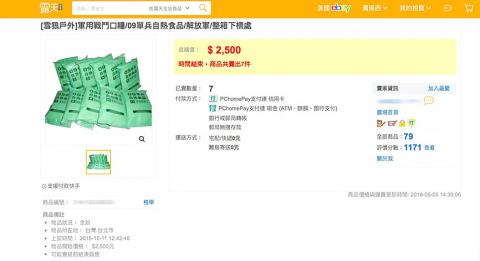No Chinese ready-to-eat meals (MREs) with pork ingredients have been imported into Taiwan, the Customs Administration said yesterday after a netizen posted a photograph on Facebook of the products, sparking concern that they could be a pathway for African swine fever to enter the nation.
MREs are packaged food that were developed as rations for soldiers.
Netizen Liu Chi-wei (劉志偉) on Thursday shared a photo of several Chinese-made MREs, two of which said in simplified Chinese characters that they were shredded pork with noodles and beef sausage.

Screen grab from Ruten.com
Liu wrote that they tasted better than rations provided to Taiwanese military personnel.
Another netizen shared a Web site showing Chinese MREs for sale on Ruten.com.
The Council of Agriculture in December last year formed an African swine fever prevention alliance with online shopping businesses, which pledged to stop selling pork products and tighten control over products sold on their platforms.
The council has contacted management personnel at Ruten.com, who said that it stopped the seller’s operations last year, as it was promoting pork products, Bureau of Animal and Plant Health Inspection and Quarantine Director-General Feng Hai-tung (馮海東) said on Friday.
The site that sold Chinese MREs was created in 2015, before China reported its first African swine fever outbreak in August last year, Feng said, adding that customs officials would investigate whether the products in the photo on Facebook had been smuggled into Taiwan.
Customs records show no cases of Chinese MREs being imported since October last year, the customs agency said yesterday.
Importers would have to obtain permission from the Food and Drug Administration to bring such products into Taiwan, it said, adding that most foreign MREs are imported from the US, Norway, Germany and Japan.
All packages that enter Taiwan undergo X-ray scans and customs personnel have been instructed to pay close attention to whether declared goods match their documents, it said.
African swine fever has spread to all Chinese provinces and regions after Hainan Province on Friday reported two cases.
As of yesterday, four Asian countries — China, Mongolia, Vietnam and Cambodia — had reported outbreaks of the disease.
Additional reporting by CNA

The first global hotel Keys Selection by the Michelin Guide includes four hotels in Taiwan, Michelin announced yesterday. All four received the “Michelin One Key,” indicating guests are to experience a “very special stay” at any of the locations as the establishments are “a true gem with personality. Service always goes the extra mile, and the hotel provides much more than others in its price range.” Of the four hotels, three are located in Taipei and one in Taichung. In Taipei, the One Key accolades were awarded to the Capella Taipei, Kimpton Da An Taipei and Mandarin Oriental Taipei. Capella Taipei was described by

The Taichung District Court yesterday confirmed its final ruling that the marriage between teenage heir Lai (賴) and a man surnamed Hsia (夏) was legally invalid, preventing Hsia from inheriting Lai’s NT$500 million (US$16.37 million) estate. The court confirmed that Hsia chose not to appeal the civil judgement after the court handed down its ruling in June, making the decision final. In the June ruling, the court said that Lai, 18, and Hsia, 26, showed “no mutual admiration before the marriage” and that their interactions were “distant and unfamiliar.” The judge concluded that the couple lacked the “true intention of

EVA Airways today confirmed the death of a flight attendant on Saturday upon their return to Taiwan and said an internal investigation has been launched, as criticism mounted over a social media post accusing the airline of failing to offer sufficient employee protections. According to the post, the flight attendant complained of feeling sick on board a flight, but was unable to take sick leave or access medical care. The crew member allegedly did not receive assistance from the chief purser, who failed to heed their requests for medical attention or call an ambulance once the flight landed, the post said. As sick

INDUSTRY: Beijing’s latest export measures go beyond targeting the US and would likely affect any country that uses Chinese rare earths or related tech, an academic said Taiwanese industries could face significant disruption from China’s newly tightened export controls on rare earth elements, as much of Taiwan’s supply indirectly depends on Chinese materials processed in Japan, a local expert said yesterday. Kristy Hsu (徐遵慈), director of the Taiwan ASEAN Studies Center at the Chung-Hua Institution for Economic Research, said that China’s latest export measures go far beyond targeting the US and would likely affect any country that uses Chinese rare earths or related technologies. With Japan and Southeast Asian countries among those expected to be hit, Taiwan could feel the impact through its reliance on Japanese-made semi-finished products and